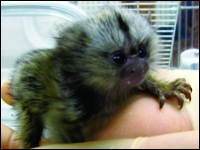 |
("keikou" means fluorescence in Japanese) Image: E. Sasaki / Nature |
 |
Image: E. Sasaki / Nature |
**__Related stories:__***linkurl:Monkey model for Huntington disease;http://www.the-scientist.com/blog/display/54652/
[19th May 2008]*linkurl:One child, two fathers -- marmoset-style;http://www.the-scientist.com/news/display/53033/
[27th March 2007]*linkurl:The first transgenic primate;http://www.the-scientist.com/article/display/19383/
[12th January 2001]














